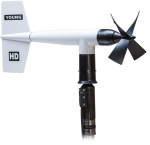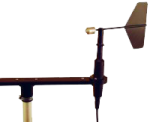






Overview
The 020C, manufactured by Met One, measures wind direction with research-grade accuracy and precision. The 020C is commonly used with the WMS100 for wind-farm power performance measurements. The 020C is especially suited to your applications that require a low starting threshold, a high damping ratio, or a short delay distance.
Read MoreImages

Detailed Description
The lightweight, airfoil vane is directly coupled to a single precision microtorque potentiometer. The built-in electronics provide a voltage source for the potentiometer and amplifies the output signal for transmission over long cable lengths.
The vane assembly is easily installed or replaced without requiring recalibration. All sensor components are constructed with stainless steel and anodized aluminum.
Compatibility
Specifications
| Sensor | Airfoil vane |
| Measurement Description | Wind direction |
| Measurement | Potentiometer (half bridge) |
| Electrical Range | 0° to 357° |
| Mechanical Range | 0° to 360° |
| Measurement Threshold | 0.5 mph |
| Measurement Linearity | ± 0.5% of full scale |
| Accuracy | ±3° |
| Damping Ratio | 0.4 |
| Delay Distance | < 91 cm (3 ft) |
| Operating Temperature Range | -50° to +85°C (-58° to +185°F) |
| Output | 0 to 5 Vdc for 0 to 360° (0 to 2.5 Vdc optional) |
| Output Impedance | 100 Ω maximum |
| Finish | Anodized aluminum |
| Maximum Cable Length | 91.44 m (300 ft) |
| Weight | 0.68 kg (1.5 lb) |
Power Requirements |
|
| Sensor Source | 12 Vdc |
| Sensor Load | 10 mA |
| Heater Source | 12 Vdc |
| Heater Load | 350 mA |
Documents
Brochures
Manuals
Frequently Asked Questions
Number of FAQs related to 020C-L: 4
Expand AllCollapse All
-
Most Campbell Scientific sensors are available as an –L, which indicates a user-specified cable length. If a sensor is listed as an –LX model (where “X” is some other character), that sensor’s cable has a user-specified length, but it terminates with a specific connector for a unique system:
- An –LC model has a user-specified cable length for connection to an ET107, CS110, or retired Metdata1.
- An –LQ model has a user-specified cable length for connection to a RAWS-P weather station.
If a sensor does not have an –L or other –LX designation after the main model number, the sensor has a set cable length. The cable length is listed at the end of the Description field in the product’s Ordering information. For example, the 034B-ET model has a description of “Met One Wind Set for ET Station, 67 inch Cable.” Products with a set cable length terminate, as a default, with pigtails.
If a cable terminates with a special connector for a unique system, the end of the model number designates which system. For example, the 034B-ET model designates the sensor as a 034B for an ET107 system.
- –ET models terminate with the connector for an ET107 weather station.
- –ETM models terminate with the connector for an ET107 weather station, but they also include a special system mounting, which is often convenient when purchasing a replacement part.
- –QD models terminate with the connector for a RAWS-F Quick Deployment Station.
- –PW models terminate with the connector for a PWENC or pre-wired system.
-
Not every sensor has different cable termination options. The options available for a particular sensor can be checked by looking in two places in the Ordering information area of the sensor product page:
- Model number
- Cable Termination Options list
If a sensor is offered in an –ET, –ETM, –LC, –LQ, or –QD version, that option’s availability is reflected in the sensor model number. For example, the 034B is offered as the 034B-ET, 034B-ETM, 034B-LC, 034B-LQ, and 034B-QD.
All of the other cable termination options, if available, are listed on the Ordering information area of the sensor product page under “Cable Termination Options.” For example, the 034B-L Wind Set is offered with the –CWS, –PT, and –PW options, as shown in the Ordering information area of the 034B-L product page.
Note: As newer products are added to our inventory, typically, we will list multiple cable termination options under a single sensor model rather than creating multiple model numbers. For example, the HC2S3-L has a –C cable termination option for connecting it to a CS110 instead of offering an HC2S3-LC model.
-
- Using Short Cut, click the applicable wind direction sensor in the Selected Sensors list of the Outputs screen.
- The two output options enabled are Sample and WindVector. Select WindVector.
- The WindVector instruction has output options. Select an option with mean wind direction in it.
-
Many Campbell Scientific sensors are available with different cable termination options. These options include the following:
- The –PT (–PT w/Tinned Wires) option is the default option and does not display on the product line as the other options do. The cable terminates in pigtails that connect directly to a data logger.
- In the –C (–C w/ET/CS110 Connector) option, the cable terminates in a connector that attaches to a CS110 Electric Field Meter or an ET-series weather station.
- In the –CWS (–CWS w/CWS900 Connector) option, the cable terminates in a connector that attaches to a CWS900-series interface. Connection to a CWS900-series interface allows the sensor to be used in a wireless sensor network.
- In the –PW (–PW w/Pre-Wire Connector) option, the cable terminates in a connector that attaches to a prewired enclosure.
- In the –RQ (–RQ w/RAWS Connector) option, the cable terminates in a connector that attaches to a RAWS-P Permanent Remote Automated Weather Station.
Note: The availability of cable termination options varies by sensor. For example, sensors may have none, two, or several options to choose from. If a desired option is not listed for a specific sensor, contact Campbell Scientific for assistance.
Privacy Policy Update
We've updated our privacy policy. Learn More
Cookie Consent
Update your cookie preferences. Update Cookie Preferences



